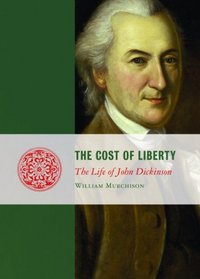Brief (216 pages with generous blank pages) but dense (including fun vocabulary like flummery*, pettifoggery and asseverate) biography of a man generally known, if he is known, as the milquetoast antagonist in 1776.
Murchison argues well that Dickinson deserves the label founding father though he voted against the second continental congress' independence resolution and would not sign the Declaration of Independence. He shows that Dickinson's opposition was with regard to timing rather than absolute opposition to independence, and that he was one of only a very few of the members of that congress who served the United States in a military capacity during the Revolutionary War. Other scholars have said that Dickinson refused to sign the Declaration based on its reasoning in the inalienable rights all people have, rather than being based on British laws and precedents and their rights being based in British citizenship which were being denied, but Dickinson does not stress that.
Dickinson was part of the constitutional convention, too, and Murchison points out how the document we've inherited as the framework of our government is different for Dickinson's contributions. He was as influential as Hamilton or Morris in the final document, perhaps as influential as anyone but Madison. Dickinson's overriding insight was seeing the states themselves as checks on the executive power, instead of just the federal congress and judiciary.
I can't compare this to other biographies of Dickinson, because I haven't read any (and this is the first one in a long while), but if it makes people more aware of this deserving person, that alone makes it a good book.
Note: One thing I think is a mistake is the claim that Dickinson was the only representative of the constitutional convention who had freed his slaves. I know Ben Franklin had owned a handful of slaves and freed them, and because slavery was already illegal in several northern states by 1787, I would think that there were other members among that affluent body of white men who could make the claim. Perhaps Murchison meant Dickinson was the only one who had freed his slaves when slavery was still legal where they lived. Then for all I know it's true. And remarkable.
* Spellcheck thinks flummery is not a word.
Murchison argues well that Dickinson deserves the label founding father though he voted against the second continental congress' independence resolution and would not sign the Declaration of Independence. He shows that Dickinson's opposition was with regard to timing rather than absolute opposition to independence, and that he was one of only a very few of the members of that congress who served the United States in a military capacity during the Revolutionary War. Other scholars have said that Dickinson refused to sign the Declaration based on its reasoning in the inalienable rights all people have, rather than being based on British laws and precedents and their rights being based in British citizenship which were being denied, but Dickinson does not stress that.
Dickinson was part of the constitutional convention, too, and Murchison points out how the document we've inherited as the framework of our government is different for Dickinson's contributions. He was as influential as Hamilton or Morris in the final document, perhaps as influential as anyone but Madison. Dickinson's overriding insight was seeing the states themselves as checks on the executive power, instead of just the federal congress and judiciary.
I can't compare this to other biographies of Dickinson, because I haven't read any (and this is the first one in a long while), but if it makes people more aware of this deserving person, that alone makes it a good book.
Note: One thing I think is a mistake is the claim that Dickinson was the only representative of the constitutional convention who had freed his slaves. I know Ben Franklin had owned a handful of slaves and freed them, and because slavery was already illegal in several northern states by 1787, I would think that there were other members among that affluent body of white men who could make the claim. Perhaps Murchison meant Dickinson was the only one who had freed his slaves when slavery was still legal where they lived. Then for all I know it's true. And remarkable.
* Spellcheck thinks flummery is not a word.




